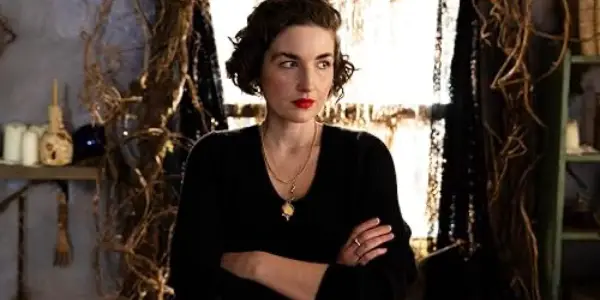Every year, I find there is one film on the program that calls louder than all the others to be seen. There is no rhyme or reason, just an unshakeable desire to see the film the moment both title and synopsis have been read. For this year’s Tribeca Film Festival, it was Elizabeth Sankey‘s Witches.
Since I was a little girl, there has always been an interest in witches and witchcraft, the historical accounts of the witch trials and the unyielding depictions on screen constantly keeping that interest alive. So seeing the title “Witches” instantly drew my attention. Discovering it was a paralleled look at the concept of witches and the less talked about perinatal effects of post partum and pregnancy, Sankey‘s deeply raw and vulnerable documentary became the festival’s first must see film.
The Transcendence of Time
There is an instant relateability to the narrator – writer, director and star – Elizabeth Sankey. She speaks of her love for witchcraft as a child, reaching into the depths of youth as her words are accompanied by a plethora of depictions of various witches throughout the history of cinema. As she speaks of her desires as a child, her narration begins to fringe on the reality of depression – mental illness working its way into the narrative fold. Sankey moves her opening monologue with grace, precision and raw exposure, delivering a paralleled thesis that transcends time. It is immediately personal, raw and vulnerable, as though the masks women all too often wear are stripped and given a breadth and platform to unfold. In a comparison that could feel cheap and initially over reached, Sankey handles it with grace and intention setting up a an infininte time loop of the female experience.

While Witches is broken into five parts, Sankey follows her monologue with her testimonial driving the purity of her truth and vulnerability even further. This is not a documentary whose thesis is based on history books, binge watches and observation, rather through personal experience. As Sankey relays her experience with post partum depression, her challenges with obtaining help and the eventual treatment she received, her testimonial opens the door for the truths of others to enter into the conversation as well.
Sankey‘s documentary becomes its own sort of coven in its depiction of not only her story, but in the testimonials of others who have joined her in exposing the raw vulnerability they have cared with them as well. With each spell, each testimonial de-mystifies the stigma of pregnancy and post partum, becoming a vital piece of art in a sea of misconception. As we work through each individuals contribution to the documentary, a picture is painted of not only the lack of knowledge of women’s healthcare, but how deeply ingrained it is in the evolution of the species.
Modern Witches
Sankey allows us to initially see the depictions – the images of which are so commonly pictured when witches are referenced. We see the boils, the deviant behavior, the insanity – a deal with the devil sealed in blood. Yet, where Witches could have been heavy handed in both thesis and depiction, Sankey delivers a strong sense of both self and art. The framework may lean into a folk inspired craft, yet its core is all too real.
For as Witches moves through each image through each story and through each struggle, it, like its subjects, finds itself on the other side with a new sense of clarity. As each testimonial brings us to the present, it also looks to the past. The witch trials plagued England and the Americas. Some might attribute it to rye poisoning, others a need to seek revenge. For Witches, it effectively posits that many of these women condemned to die may have also been suffering from postpartum psychosis. It is a striking revelation in the narrative construction of Witches that perfectly brings the film fun circle.
Conclusion
As Witches comes to its final moments, a new sense of clarity and understanding in its wake, we find Sankey with her son. Witches may not be the most talked about film at this year’s festival, but it is certainly the most vital.
Does content like this matter to you?
Become a Member and support film journalism. Unlock access to all of Film Inquiry`s great articles. Join a community of like-minded readers who are passionate about cinema - get access to our private members Network, give back to independent filmmakers, and more.